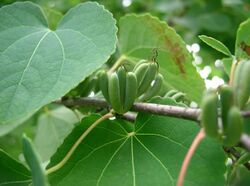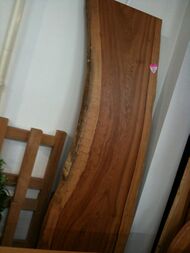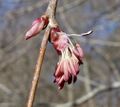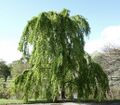Biology:Cercidiphyllum japonicum
| Cercidiphyllum japonicum | |
|---|---|
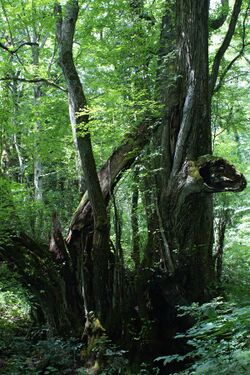
| |
| The "Great Katsura of Wachi", Torokawataira, Kami, Hyogo Prefecture, Japan | |
| Scientific classification | |
| Kingdom: | Plantae |
| Clade: | Tracheophytes |
| Clade: | Angiosperms |
| Clade: | Eudicots |
| Order: | Saxifragales |
| Family: | Cercidiphyllaceae |
| Genus: | Cercidiphyllum |
| Species: | C. japonicum
|
| Binomial name | |
| Cercidiphyllum japonicum Siebold & Zucc.
| |
Cercidiphyllum japonicum, known as the katsura (from its Japanese name カツラ, 桂), is a species of flowering tree in the family Cercidiphyllaceae native to China and Japan . It is sometimes called caramel tree for the light caramel smell it emits during leaf fall.[2]
Description
The tree is deciduous and grows to 10–45 meters tall, with a trunk diameter of up to 2 meters (rarely more).[3][4][5]
The shoots are dimorphic, with long shoots forming the structure of the branches and short shoots being born from their second year onward. The leaves are produced in opposite pairs on long shoots and singly on short shoots; they have a 1.4–4.7 cm petiole, and are rounded with a heart-shaped base and a crenate margin. Leaves on short shoots are larger, 3.7–9 cm long and 5–8.3 cm broad, and those on long shoots smaller, being 3.2–4.5 cm long and 1.9–3.2 cm broad. The leaves turn a variety of pinks and yellows in autumn and sometimes have a distinctive caramel scent when in fresh autumn colors. The flowers are inconspicuous and produced in early spring among the opening leaves, with male and female flowers on separate plants (dioecious). The fruit is a cluster of two to four follicles 1–1.8 cm long and 2–3 mm wide with each follicle containing several winged seeds.[3][4]
Status
The species is listed as endangered in China, but overall when Japanese populations are included C. japonicum is classified as being lower risk.[5] The Chinese populations were sometimes distinguished in the past as Cercidiphyllum japonicum var. sinense Rehder & E.H.Wilson, but this is now generally regarded as not distinct from the species.[3][4]
Cultivation
Katsura is a popular ornamental tree in Japan as well as elsewhere. In Japan, it is also grown for its timber, which is used for construction and woodworking.
Several different cultivars are grown, including 'Aureum', 'Heronswood Globe', and 'Ruby'. The following have gained the Royal Horticultural Society’s Award of Garden Merit (confirmed 2017):[6]
Gallery
References
- ↑ Barstow, M. (2020). "Cercidiphyllum japonicum". IUCN Red List of Threatened Species 2020: e.T32332A67739810. doi:10.2305/IUCN.UK.2020-1.RLTS.T32332A67739810.en. https://www.iucnredlist.org/species/32332/67739810. Retrieved 19 November 2021.
- ↑ Katsura - the Caramel tree. In h2g2.com.
- ↑ 3.0 3.1 3.2 Andrews, S. (1998, 1999). Tree of the Year: Cercidiphyllum japonicum. International Dendrology Society Yearbook 1997: 17-45; 1998: 33-38.
- ↑ 4.0 4.1 4.2 Flora of China: Cercidiphyllum japonicum
- ↑ 5.0 5.1 Chen, C., Liu, Y-H., Fu, C-X., & Qiu, Y-X. (2010). New microsatellite markers for the rare plant Cercidiphyllum japonicum and their utility for Cercidiphyllum magnificum. Amer. J. Bot. 97 (9): e82–e84 full text.
- ↑ "AGM Plants - Ornamental". Royal Horticultural Society. July 2017. p. 17. https://www.rhs.org.uk/plants/pdfs/agm-lists/agm-ornamentals.pdf.
- ↑ "RHS Plantfinder - Cercidiphyllum japonicum". Royal Horticultural Society. https://www.rhs.org.uk/Plants/3415/i-Cercidiphyllum-japonicum-i/Details.
- ↑ "RHS Plantfinder - Cercidiphyllum japonicum 'Heronswood Globe'". Royal Horticultural Society. https://www.rhs.org.uk/Plants/124219/i-Cercidiphyllum-japonicum-i-Heronswood-Globe/Details.
- ↑ "RHS Plantfinder - Cercidiphyllum japonicum f. pendulum". Royal Horticultural Society. https://www.rhs.org.uk/Plants/94012/i-Cercidiphyllum-japonicum-i-f-i-pendulum-i/Details.
External links
- Cercidiphyllum japonicum images at the Arnold Arboretum of Harvard University Plant Image Database
- "Katsura, Cercidiphyllum japonicum, China 1910." Library Featured Images, Arnold Arboretum of Harvard University website, 14 September 2017. Accessed 1 May 2020.
- Friedman, William (Ned). "Leaves have teeth too." Posts from the Collection, Arnold Arboretum of Harvard University website, 18 April 2020. Accessed 1 May 2020.
- Dosmann, Michael and Andrew Gapinski. "Posts from the Field: Chasing Wilson in Northern Sichuan." Arnold Arboretum of Harvard University website, 16 October 2017. Accessed 1 May 2020.
Wikidata ☰ Q526549 entry
 |


